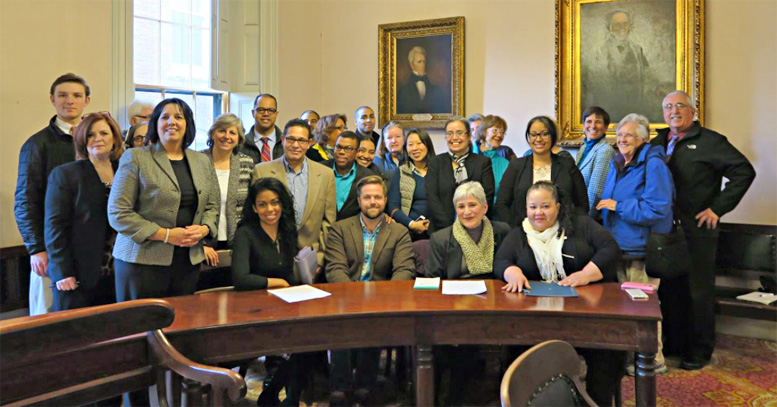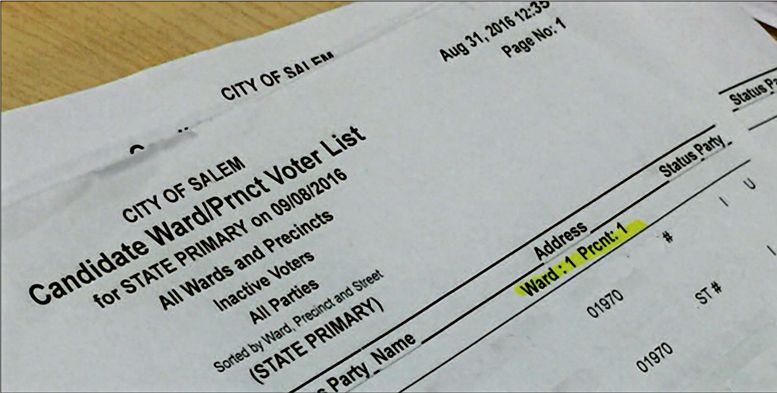For several years the City Clerk has been aware of alleged voter intimidation and discrimination in Salem
By: Mike Givens/TRT Assistant Editor—
SALEM, Mass.—The timeline is four-and-a-half pages long, spans 11 years, and documents a long process to ensure that Spanish-speaking residents of Salem have equitable access to polling locations without the fear of being harassed or having their rights violated.
“The complaints of voting rights violations go back as far as 2005,” said Ana Nuncio, a Salem resident and president of the Latino Leadership Coalition (LLC). “We need more bilingual poll workers at every ward in the City … ”
According to the timeline co-authored by Nuncio, between April 2005 and April 2015, the LLC, in coalition with the North Shore Community Development Coalition (NSCDC), and the Point Neighborhood Association (PNA), made no less than 15 attempts via e-mails, phone calls, or letters, to discuss issues related to voter intimidation and polling location access for Spanish-speaking residents of Salem. Eleven of the 15 attempts received no response, as evidenced in the document.
A letter dated March 26, 2015 sent to Salem City Clerk Cheryl LaPointe and the Registrars of Voters alleged that on election days in both November 2012 and 2014, Spanish-speaking voters experienced significant language barriers due to a lack of bilingual poll workers, police intimidation, and requests for identification in order to vote that reportedly were not made of white voters.
“The matter that needs immediate attention and resolution is poll worker training, specifically as it relates to the violations that were committed by poll workers on Election Day, November 4, 2014,” a portion of the letter reads.
In August of 2015, an LLC member drafted two memorandums of understanding (MOU) between the City of Salem and the coalition reiterating the voting rights of all Salem residents. The MOUs were signed in February and May of 2016 and while advocates are optimistic about their potential, there’s still a battle being waged to garner full support from a key city official.
Voting Rights in Massachusetts
The Commonwealth of Massachusetts currently has a 15-point Voters’ Bill of Rights that lays out the protections afforded to registered voters in the state:
- You have the right to vote if you are a qualified registered voter.
- You have the right to cast your ballot in a manner that ensures privacy. You have the right to vote without any person trying to influence your vote and to vote in a booth that prevents others from watching you mark your ballot.
- You have the right to remain in the voting booth for five (5) minutes if there are other voters waiting and for ten (10) minutes if there are no other voters waiting.
- You have the right to receive up to two (2) replacement ballots if you make a mistake and spoil your ballot.
- You have the right to request assistance when voting from anyone of your choice. If you do not bring someone with you, you have the right to have two (2) poll workers assist you.
- You have the right to vote if you are disabled. The polling place must be accessible, and there must be an accessible voting booth.
- You have the right to vote if you cannot read or write or cannot read or write English.
- You have the right to vote but must show identification if: you are a first-time voter who registered to vote by mail and did not submit identification with the voter registration form; or your name is on the inactive voter list; or your vote is being challenged; or if requested by a poll worker. Acceptable forms of identification are: Massachusetts driver’s license, other printed documentation containing your name and address such as a recent utility bill, rent receipt on landlord’s letterhead, lease, or a copy of a voter registration acknowledgment or receipt.
- You have the right to vote by absentee ballot if: you will be absent from your city or town on Election Day; or if you have a physical disability that prevents your voting at the polling place; or if you cannot vote at the polls due to religious belief.
- You have the right to cast a provisional ballot if you believe you are a qualified registered voter but a poll worker tells you that you are ineligible to vote.
- You have the right to follow up any challenge to your right to vote through the complaint process.
- You have the right to vote if you are not currently incarcerated for a felony conviction and have registered as a voter after your release.
- You have the right to take this Voters’ Bill of Rights or any other papers, including a sample ballot, voter guide or campaign material into the voting booth with you. Please remember to remove all papers when you leave the booth.
- You have the right to vote at your polling place [anytime] between 7 a.m. and 8 p.m. for state and federal elections—hours may vary for local elections. If you are in line at your polling place when the polls close at 8 pm, you have the right to vote.
- You have the right to bring your children into the voting booth with you.
The coalition lead by the LLC alleged that violations of numbers two, five, seven, and eight have occurred regularly on multiple election days for Spanish-speaking residents of Salem.
The Allegations
In the Fall of 2012, Salem State University Professor Tiffany Gayle Chenault was teaching a social inequality class. Professor Chenault partnered with the NSCDC on a class project to train her students to become poll monitors for the Tuesday, November 6 election. In a video series taped after Election Day, Professor Chenault discussed the eye-opening experience for the students who worked the polls that day in Salem’s Point Neighborhood, an area that has a high concentration of Spanish-speaking residents.
“The outrage, the disgust, the shear ‘I don’t believe this is happening’ expressions [on their faces] was priceless,” she said, noting that observing discrimination at the polls was a much more rich experience for the students than merely showing videos and assigning readings.
“I think a huge cause was the language barrier,” said an SSU student identified as “Anne,” who in the video series said she witnessed voting rights violations at the Bentley Elementary School in Salem’s Ward 1. “The poll monitors were not understanding the people from the Point [neighborhood] … they couldn’t communicate with them. They couldn’t find their names on the lists because they weren’t understanding their accents.”
Anne also reported seeing a police officer tell two people that they could not assist Spanish-speaking voters in filling out their ballots, which is a violation of the Voter’s Bill of Rights.
“I don’t think the poll workers had an idea of the laws in place,” said another student identified as “Stephanie.”
Stephanie said she witnessed poll workers asking people for their identification and then turning them away if they did not provide it.
“I noticed that there was a sense of bias as I was watching,” she said, “They would ask for IDs from everyone except the Caucasian people. They would just let them vote and give them no trouble at all.”
Salem resident Lucy Corchado, a former city councilor for Ward 1 and president of the Point Neighborhood Association, said she was startled by the amount of discrimination she’s experienced.
“Personally, I was taken aback by the attitude and questioning I received when trying to assist a voter who not only asked for my assistance, but I [had] also asked permission from the poll worker to be able to help her,” she said, noting that she had the permission of the poll worker to assist the person asking for translation help.
“Suddenly I get a tap on the shoulder by the [police] officer telling me he couldn’t have me ‘hover over the voters.’ After telling him [the] voter had [every] right to request my assistance and if he needed further proof I could give him [the] … voter rights, he said it wasn’t needed and that ‘he trusted me.’”
Corchado said the experience humiliated her.
“This frustration turned to anger when I was told [the] same officer took a sample ballot from a resident who was using it as a guide … and questioned her as to where she obtained the form and proceeded to ask for her ID and then take a picture of her ID with his cell phone.”
The alleged violation of rule 13 of the Voters’ Bill of Rights was so upsetting to the woman that she vowed never to vote again after experiencing the incident, according to Corchado.
Yoleny Ynoa, a 22-year resident of Salem, said that he’s experienced discrimination at the polls also. Ynoa, who works with elderly Spanish speakers, said that he’s had experiences where he’s taken someone to vote and been confronted by poll workers about his providing assistance.
Ynoa says that in one instance, he took his 83-year-old mother to vote and asked a poll worker if he could assist her in filling out her ballot.
“No, you cannot help your mother,” the poll worker allegedly said to Ynoa and told him that she would ask another poll worker to provide assistance. According to Ynoa, a police officer was called to escort him away.
“The police officer told me ‘you cannot be here anymore,’” Ynoa said, noting that the officer told him he had to leave.
“This is breaking the law. This is not right. I did nothing wrong. I was just trying to help my mom to vote.”
In 2014, Ynoa says that he took another elderly woman to the polls to vote. This woman took a sample ballot she completed with her and wanted to use it to fill out the ballot she would cast. Ynoa said that a poll worker confiscated the sample ballot.
“Things like that are not good for our community,” Ynoa said. “Because we’re Latino people, they think we’re doing something wrong. We’re not doing anything wrong.”
The MOUs

Members of the LLC, the Mayor, the Mayor’s Office, the Salem Police Chief and Captain, the CDC, and others at City Hall during the signing of the MOUs.
In August 2015, an MOU was drafted to reinforce the voting rights of Salem residents, specifically Spanish-speaking residents. There were two versions of the MOU drafted, one being signed in February by Salem Mayor Kim Driscoll, Salem Police Department Chief Mary Butler and the members of the coalition. The other was signed in May by the Chair of the Board of Registrars and the coalition.
“It’s due to the Board’s duties and responsibilities versus the Mayor and Police Chiefs’ duties and responsibilities,” said Donald Bates, a member of the Salem Registrars of Voters, about the need for two MOUs.
Bates emphasized that the registrars cannot function as election workers because they recount votes when necessary. It would be a conflict of interest for election workers to also serve as vote counters, according to Bates. Since the Mayor and Police Chief may serve as election workers and provide support and assistance on Election Day, Bates said that he felt it was prudent to have two separate MOUs, one for those identified as election workers and the other for the registrars.
“I was also concerned that the Board not give any preferential treatment to a ‘Special Interest Group’ such as the LLC over any other special interest group or organization by signing an MOU,” Bates added. “In the future, the Board [of Registrars] may consider signing the same or similar MOU with any other special interest group that may seek such a document.”
Mayor Kim Driscoll reiterated the city’s dedication to equitable voting rights.
“The MOU itself calls for specific actions for training poll workers, providing educational materials, facilitating more bilingual assistance at polling places, and working collaboratively to ensure that Salem residents’ voting rights are upheld, no matter their ethnic or racial background or their ability to speak English,” she said.
A signature missing from both MOU’s was that of Salem City Clerk, Cheryl LaPointe, who works under the supervision of the Salem City Council. When asked by The Rainbow Times about her decision to not sign either MOU, LaPointe stated:
“First let me say that the MOU does not need my signature. As the City Clerk my job is to allow all eligible residents of the City of Salem to register to vote and to exercise their right to vote regardless of age, sex, race/color, disability, religion or national origin. I follow all federal and Massachusetts general laws for all elections. The MOU[s] [are] for a particular group only and as I stated elections are for all eligible residents.”
Corchado of the PNA said she was disheartened by LaPointe’s refusal to sign the MOU.
“Respectfully, by signing the MOU, it would show good faith in trying to work together to ensure a much more positive voting experience for all,” she said.
Mayor Driscoll echoed Corchado’s contention saying, “While the Clerk does not need to sign the MOU in order for it to be valid, I hope that she and the City Council, to whom she reports, will ultimately join myself, Salem Police Chief Mary Butler, and the Board of Registrars of Voters, in agreeing with the values in that document and signing on to it.”
City Council President Josh Turiel agreed with LaPointe’s decision to not sign the MOUs.
“I am fine with the MOU and the goals within it,” he said. “The document, though, has no legal force to back it up and seems to give one group more of a seat at the table than any other, which concerns me.
“The City Council is not a signatory to it nor were we involved in the discussions that created it. Since we have no role in elections as a body other than the appointment of the City Clerk, I don’t believe we should be a signatory to this, either.”
Allegations of Inconsistent Translation Services
Nuncio of the LLC said that there are also issues of inadequate translation services for Spanish speakers. She expressed frustration with a lack of Spanish-language ballots for voters.
According to LaPointe, a proposal to provide Spanish-language ballots is in committee.
“In order to have Spanish on the ballots it requires a Home Rule Petition through the legislature, and it would only be for municipal elections, it would not be for federal or state elections,” she said.
According to the federal Voting Rights Act, if more than five percent of a municipality’s population speaks another language and is classified as “limited-English proficient,” then voting materials in that particular jurisdiction must be bilingual. LaPointe said that the next federal census in 2020 will determine how many Spanish-speakers are living in Salem and whether all voting materials will be bilingual. According to the 2010 Census, a little more than 15 percent of Salem’s population is Latino/Hispanic, but it’s unclear whether enough voters in that demographic meet the “limited-English proficiency” requirement.
“We provide bilingual voting materials sent by the state law such at the Voter’s Bill of Rights and any other material that we can have translated to assist voters,” she said. “For the City’s municipal election in 2015 I had the English specimen ballot translated into Spanish.”
LaPointe also stated that the City has made accommodations to have more bilingual poll workers.
“For language barriers we have enlisted translators and bilingual poll workers for those with limited English proficiency with the help of the Latino Coalition,” she said, also noting that the City is attempting to hire a part-time bilingual assistant in the Elections Office.
Inactive Voter List
On June 2, out of the 27,894 registered voters in Salem, Nuncio said nearly 7,000 were placed on the state’s Inactive Voter List (IVL). Every year, each city and town in Massachusetts is required to compose a “street list,” also known as a census. A voter who fails to respond to the census is placed on the IVL and a notice is sent to their address asking for confirmation that they still reside there. If the confirmation is answered, the voter is taken off the list and reconfirmed as an active voter. If the confirmation is not answered, the voter is kept on the list.
On Election Day, if a voter shows up to the polls and is on the IVL, that voter must fill out an Affirmation of Current and Continuous Residence, show a valid ID that contains their address, and have the affirmation signed by a warden.
Nuncio said she purchased a copy of the Salem list and approximately 1,200 Latino voters had been deactivated, including Lucy Corchado.
“I really don’t know how my name got on the list,” Corchado said. “I was pretty shocked. I did send in the census. I don’t know whether it was misplaced or lost, but I did fill it out and send it in.”
Corchado said she had to visit City Hall and fill out the census form to get her name off the list, but said that it may not have been that easy for others.
“For other folks, it would have been an inconvenience to come to City Hall during business hours [to fill out the census],” she said.
Meanwhile, Nuncio got to work sending notices in English and Spanish to all Latino voters on the list informing them of their inactive status and encouraging them to re-register to vote. Both Nuncio and Corchado coordinated a voter registration drive throughout the summer.
In August, a meeting between LaPointe, Salem City Solicitor Beth Rennard, and an attorney for the Elections Division of the Secretary of State was held about the IVL. After that meeting, LaPointe issued a letter to the Secretary of State’s office asking that the entire list of inactive voters in Salem be reactivated due to an “inconsistency” in amendments to the state’s IVL law in 2016. LaPointe also noted in the letter that since a presidential election is being held in November, the city was expecting a higher than normal voter turnout.
On September 29, The Rainbow Times was informed that another inactive voter list was circulating despite the August letter to the Secretary of State asking for a full reversal.
According to Nuncio, the list contained 3,326 inactive voters, with 708 Latino voters.
The Rainbow Times also learned that on the evening of September 28, the Salem Board of Registrars met and the IVL was the subject of part of the meeting.
Nuncio, who said she attended the meeting, reported that LaPointe was using a new set of criteria for the revised IVL. According to Nuncio, that criteria included whether a Salem resident had voted in the last four years and whether that same resident had signed any nominating papers.
Attempts to reach LaPointe and other members of the Board of Registrars about the meeting and the revised criteria for the list were unsuccessful.
Moving Forward
Since the signing of the MOUs, there have been relatively few complaints about discrimination against Latino people at polling locations in Salem.
“It’s a help to our community,” said Ynoa. “It’s a fight for everybody … The MOUs encourage the city to do the right job in the right way.”
Nuncio said the city has stepped up to address the instances of discrimination and intimidation at polling locations.
“Police Chief Mary Butler has been very forthright and proactive about the reported abuses during the elections of 2014,” she said. “She was the first public official to indicate support for, and to sign, the MOU.”
Donald Bates of the Board of Registrars said that at the recent primary in September he didn’t observe any instances of discrimination.
“As far as the Sept. 8 election, I did not observe or have not heard of any significant problems with voting,” he said. “I was present at Precincts 1 and 2, which have significant numbers of Latino residents, for six hours during peak voting times and did not note any significant voting problems.”
Salem City Councilor Beth Gerard said that the MOUs signal a new beginning, one that will facilitate a shift in behaviors.
“The Voting Rights Act of 1965 took time and a great deal of effort to fully implement, and yet there continues to be voting rights issues 51 years later, so I expect that this is the start of changing behaviors at the polls,” she said. “As a community who is recognizing that change needs to happen—even though there are some who have yet to realize that there is a problem—this is where our starting point is.”
MOUs and Discrimination
Mickey Northcutt, chief executive officer of the NSCDC, said that while the MOUs show positive movement, they by no means signal the end of voting discrimination.
“Signing the [MOUs] does not mean that we have achieved equitable access to voter participation in Salem,” he said. “It is a step in the right direction, but the parties involved actually need to take proactive steps as outlined in the MOUs and otherwise to ensure that our citizens are treated equally going forward.
“The Registrars of Voters and the City Council, who oversee city elections and the City Clerk, respectfully, also need to fulfill their obligations to do so going forward.”
Ynoa, while optimistic about the MOUs and the accountability they ensure, is preparing himself for Election Day on Tuesday, November 8 and any potential problems at the polls.
“In November, we will take a lot of people to vote and we need to make sure there are no issues. If there are any problems, we are going to let the media know.”
To learn more about the Latino Leadership Coalition, visit their Facebook page at https://goo.gl/5c8z9Z. To find your polling location in Massachusetts, visit www.wheredoivotema.com.
Salem, Massachusetts – Early Voting Times and Locations
City Hall – 2nd Floor Council Ante Room
Monday, October, 24, 2016 (8 a.m. – 4 p.m.)
Tuesday October 25, 2016 (8 a.m. – 4 p.m.)
Wednesday, October 26, 2016 (8 a.m. – 4 p.m.)
Thursday, October 27, 2016 (8 a.m. – 7 p.m.)
Friday, October 28, 2016 (8 a.m. – 12 p.m.)
Monday, October 31, 2016 (8 a.m. – 4 p.m.)
Tuesday, November 1, 2016 (8 a.m. – 4 p.m.)
Wednesday, November 2, 2016 (8 a.m. – 4 p.m.)
Thursday, November 3, 2016 (8 a.m. – 7 p.m.)
Friday, November 4, 2016 (8 a.m. – 7 p.m.)
Salem High School Auditorium
Thursday, October 27, 2016 (8 a.m. – 7 p.m.)
Friday, October 28, 2016 (4 p.m. – 8 p.m.)
Salem Academy Charter School (Shetland Properties, Congress St.)
Saturday, October 29, 2016 (8 a.m. – 1 p.m.)







